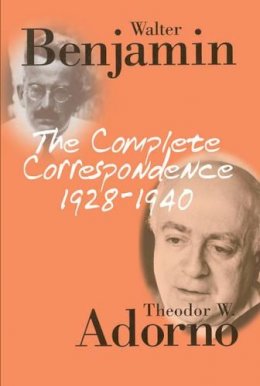
Stock image for illustration purposes only - book cover, edition or condition may vary.
The Complete Correspondence 1928 - 1940
Theodor W. Adorno
€ 33.80
FREE Delivery in Ireland
Description for The Complete Correspondence 1928 - 1940
Paperback. The surviving correspondence between Walter Benjamin and Theodor W. Adorno. * This is the first time all of the surviving correspondence between Adorno and Benjamin has appeared in English. * Provides a key to the personalities and projects of these two major intellectual figures. Num Pages: 392 pages. BIC Classification: 3JJG; 3JJH; HPC. Category: (P) Professional & Vocational; (UP) Postgraduate, Research & Scholarly; (UU) Undergraduate. Dimension: 229 x 153 x 18. Weight in Grams: 574.
The surviving correspondence between Walter Benjamin and Theodor W. Adorno.
The surviving correspondence between Walter Benjamin and Theodor W. Adorno.
- This is the first time all of the surviving correspondence between Adorno and Benjamin has appeared in English.
- Provides a key to the personalities and projects of these two major intellectual figures.
- Offers a compelling insight into the cultural politics of the period, at a time of social and political upheaval.
- An invaluable resource for all students of the work of Adorno and especially of Benjamin, extensively annotated and cross-referenced.
Product Details
Publisher
John Wiley and Sons Ltd United Kingdom
Number of pages
392
Format
Paperback
Publication date
2003
Condition
New
Number of Pages
392
Place of Publication
Oxford, United Kingdom
ISBN
9780745632148
SKU
V9780745632148
Shipping Time
Usually ships in 7 to 11 working days
Ref
99-50
About Theodor W. Adorno
Theodor W. Adorno (1903-1969) and Walter Benjamin (1892-1940) were prominent members of the Frankfurt School, and among the most influential thinkers of the twentieth century in the areas of social theory, philosophy, literary criticism and aesthetics.
Reviews for The Complete Correspondence 1928 - 1940
"[In this volume] the reader witnesses the hesitant, tension-filled process by which two individuals come together – individuals who could scarcely have approached each other in any other way than through the mediation of this literary form." Jürgen Habermas, Die Zeit "The extraordinary and unique qualities of this correspondence stem from the confrontation in stages between two of the most intense and energetic minds of the last century." Fredric Jameson, Duke University "To reconsider the relationship between Theodor Adorno and Walter Benjamin is to reflect on one of the most enduring philosophical friendships of the twentieth century." Richard Wolin, New Republic "The first time the letters of these two great minds have been published in their entirety makes for endlessly crunchy reading that combines high-octane intellectual jousting with a touching arm’s-length friendship and, towards the end, a personal tragedy, as Benjamin’s situation gets inexorably worse. The sinewy dialogues on various topics – music, painting, poetry, Adorno’s theory of dialecticism, Benjamin’s aesthetics – throw up constant insights into how their major ideas were formed, as it were, out of live, fluid thinking." Steven Poole, The Guardian
